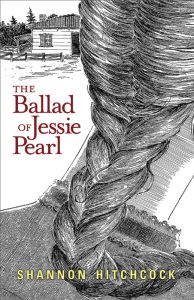
- Home
- Books
- Bio
- Author Visits
- For Teachers
- For Press
- For the Press Of Words & Water
- For the Press Dancing in the Storm
- For the Press Story Quilts
- For the Press She Sang for the Mountains
- For the Press Saving Granddaddy’s Stories
- For the Press – Flying Over Water
- For The Press – One True Way
- For the Press – Ruby Lee & Me
- For the Press – The Ballad of Jessie Pearl
- Press Release ONE TRUE WAY
- Media Release – The Ballad of Jessie Pearl
- BLOG
- Store
- Contact
The Ballad of Jessie Pearl
Young Adult
Namelos, 2013
ISBN: 978-1-60898-141-0
Book Cover Art is by Timothy Decker
Sometimes when the kerosene lamp casts shadows, I think I see Ma’s ghost. If she were still alive, she’d say, Jessie Pearl, you keep on studying. Not everybody is cut out to be a farm wife. We’ll find a way to pay for teachers’ college. Leave your Pa to me.

And tonight, Ma would notice how my hands are trembling. I can almost hear her voice. Jessie, fourteen is too young to help birth a baby. Why don’t you go and study in the kitchen? But Ma is just a memory.
It’s 1922, and Jessie has big plans for her future, but that’s before tuberculosis strikes. Though she has no talent, for cooking, cleaning, or nursing, Jessie puts her dreams on hold to help her family. She falls in love for the first time ever, and suddenly what she wants is not so simple any more.
Inspired by Shannon Hitchcock’s family history, THE BALLAD OF JESSIE PEARL wraps you like an old quilt in the traditions, tastes, and dialect of rural North Carolina.
Praise for The Ballad of Jessie Pearl.
Inspired by Shannon Hitchcock’s family history, THE BALLAD OF JESSIE PEARL wraps you like an old quilt in the traditions, tastes, and dialect of rural North Carolina.
The Ballad of Jessie Pearl, Young Adult
“With the poetry of plain speaking, Shannon Hitchcock recreates the daily drama of a vanished world.”
Richard Peck, Author, Playwright & Entertaining Speaker
This fast-paced historical novel is filled with enough factual detail, recognizable emotions, and personal drama to keep readers turning pages, eager to learn the final verse in the ballad of Jessie’s life. An author’s note about the story’s origins in actual events could inspire students to seek out family stories of their own.
School Library Journal
Told in a believable first person, present-tense voice that emphasizes the immediacy of Jessie’s problems and her sometimes-raw emotions, Hitchcock’s debut also neatly captures a full flavor of the setting [a North Carolina tobacco farm] and period [1920s]. The aspects of many characters are also effectively revealed, mostly through authentic-sounding dialogue. …A satisfying tale for readers who don’t require a fully happy ending.
Kirkus Reviews, American book review magazine founded in 1933 by Virginia Kirkus
Hitchcock’s debut novel introduces 14-year-old Jessie Pearl, who endures more than her fair share of hardships, beginning with the death of her mother. Opening in 1922, the story follows the daily activities on the family’s North Carolina tobacco farm. …Hitchcock’s story is gently and lovingly written, with elements drawn from her own family history. Its detailed honesty about the particular struggles of the period, especially for strong women (Maude, a no-nonsense midwife, is particularly memorable), is significant.
Publisher's Weekly, International News Website of Book Publishing
This is a beautifully written book based on the author’s family history and gives teen readers an interesting glimpse at a time in our history when medical interventions were not as sophisticated as they are now and the impact of these limitations on families.
Children's Literature, Provides Children's and Young Adult Book Reviews
Hitchcock’s seemingly gentle tale ultimately reveals a powerful tension between Jessie’s love for her baby nephew and her deceased sister, and that of the equally strong pull for independence. …. First love, the risk and thrill of the unknown, a beautiful family that shores her up when she feels weak—all these forces tumble about in a believable manner as Jessie figures out her future one day at a time. You can almost hear the gentle fiddle tune playing in the background as she does so.
Booklist, The best book reviews for public & school libraries
Rooted in Hitchcock’s own family history, the story of Jessie Pearl has a sincere tone to it that many readers will appreciate. Jessie’s character is particularly believable, and readers will be able to relate to her difficult choices. ….
[T]his could be a good choice for a classroom novel study.Voice of Youth Advocates, Book Reviews Young Adult Materials for Librarians
In time for Women’s History Month, this book offers a realistic and heart-wrenching story of the choices, or lack of choices, women of earlier eras faced. Throughout the book readers will be eagerly awaiting the choice that Jessie makes to determine her future.
Reading Today Online




